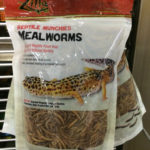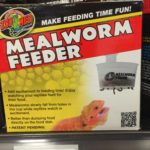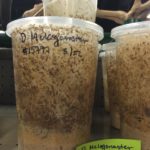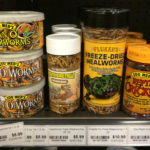A great part of the growing world human population has no reliable access to sufficient, affordable nutritious food. Among the many options proposed to increase food security, insects are a candidate that can satisfy the requirements of sufficiency, reliability, and nutrition. Insects are eaten in many parts of the world, e.g., suri palm beetles in the Amazon, waterbugs in Thailand, and mopane caterpillars in southern Africa. Overcoming the taboo against eating insects in European and North American cultures is a definite stumbling block to shifting food choices away from energy-consumptive beef production or water-costly corn to a cheaper, efficient insect model.
However, insect-eating taboos do not discourage Americans and Europeans from offering insects to their pet animals. A visit to any pet store reveals aisles of attractively-packaged, organic, “gourmet” pet food (Photos below: CS Chaboo). Insects are the oldest farmers – pollinating plants. Insects are also one of the oldest farmed animals (i.e., honey bees and silkworms). It is important to planetary health and future human food security that we develop insect farming, with its less costly footprint (space, water, energy) and less waste, for alternative protein resources. Feeling good about offering our pets such an eco-friendly and sustainable food may be a subversive educational tool to overcome Homo sapiens’ recent squeamishness to eating insects.

Learn more at this collection of TEDx talks on insect farming for food:
http://4ento.com/video-ted-talks/
UN Biodiversity: https://www.facebook.com/UNBiodiversity/videos/1054782784599753/
Food and Agriculture Organization (FAO): http://www.fao.org/docrep/018/i3253e/i3253e00.htm



Comments are closed.